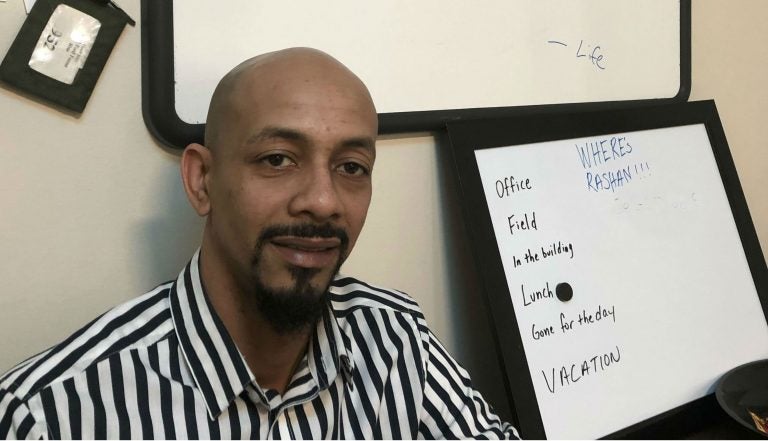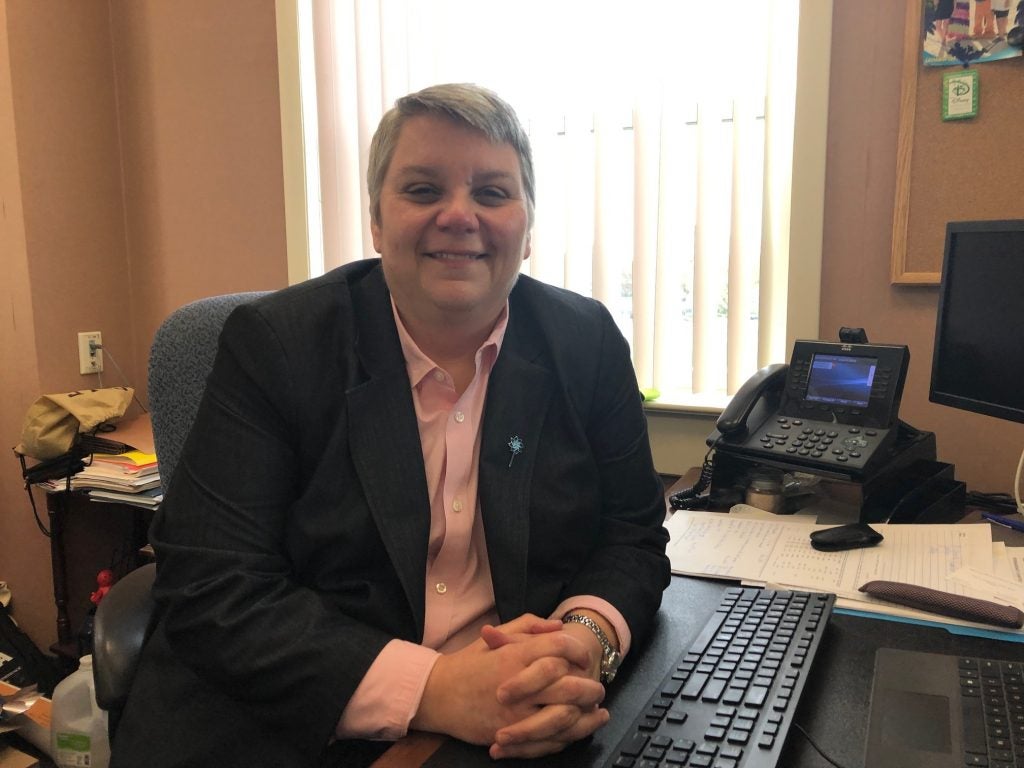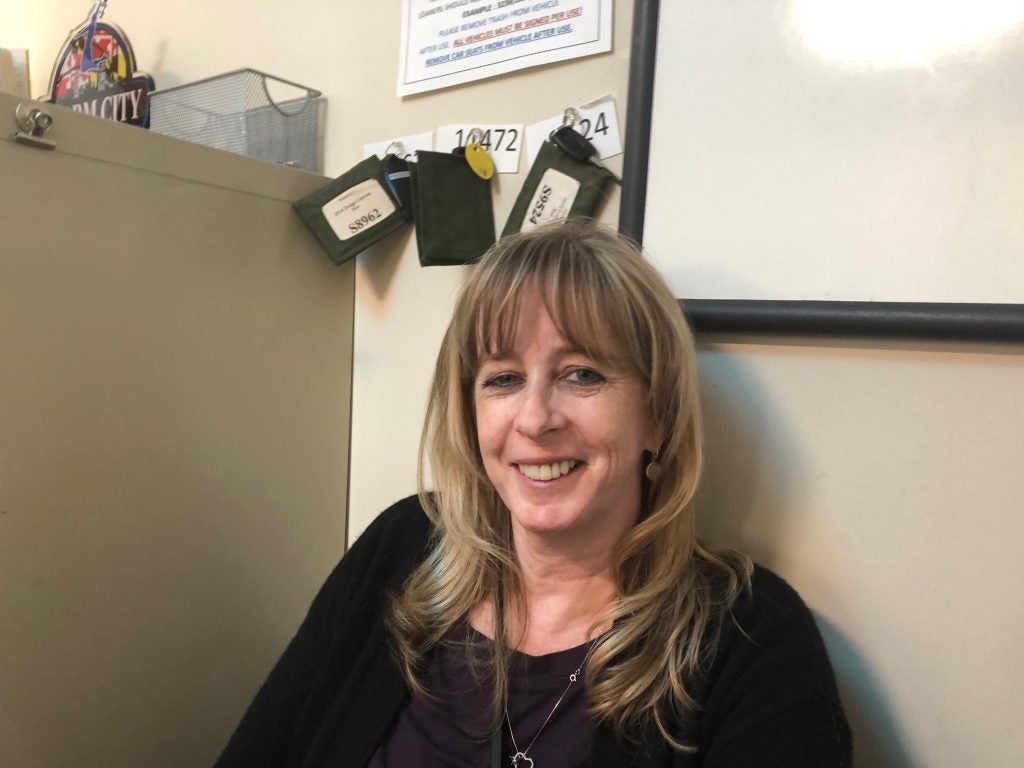Caseloads for Delaware child-abuse investigators are double the legal limit
Turnover among Delaware’s child-abuse investigators runs 40% a year. The state doesn’t have enough to meet its legal standard for caseloads.
Listen 4:26
Rashan Henry, a veteran child abuse/neglect investigator and now a supervisor, says 'cases never stop because kids are getting abused every day.' (Cris Barrish/WHYY News)
The number of complaints about child abuse and neglect in Delaware has more than doubled in the last decade. Yet the number of social workers to investigate those allegations hasn’t kept pace — and is substantially below the number set by Delaware law.
To alleviate the pressures on those investigators and better protect children, the Division of Family Services is trying to put more workers on the front lines.
Rashan Henry, who investigated child abuse and neglect reports for a decade for the state and is now a supervisor, said his employees deal with situations most people only see on television crime dramas.
In an interview with WHYY, Henry said he tells his friends, “I see the things that you guys think aren’t real, People don’t’ think sex trafficking is real. People don’t believe that little kids get molested and raped by their families on a daily basis.”
A serious case of neglect, Henry said, “would be if you see a kid Dec. 15, 10 inches of snow, going to school with high water pants on, no socks, no coats and a T-shirt. Freezing to death. We see that.”
Kids are also punched, beaten with belts or burned with cigarettes. They live in households where one or both parents is strung out on drugs or booze. Homes are filthy and deteriorating. Some have no food.
Low pay, high caseloads
Yet Delaware has historically not had enough social workers to promptly and adequately investigate allegations.
State code has long required Delaware to have enough workers so caseloads don’t exceed 11 — the standard now recommended by the Child Welfare League of America.
But the Delaware caseload is about 20, and some workers have 40 cases.
It’s a problem Division of Family Services director Trenee Parker readily admits.
Asked if the state is breaking the law, Parker doesn’t hesitate. “Absolutely,’’ she responded.

Parker said a five-year plan started in 2018 would add enough positions to reach the standard. But the turnover rate is 40% a year, impeding that effort. Parker said many leave for jobs in schools or hospitals.
There are now 111 investigators, up from just 69 six years ago.
Cases are funneled to them from the hotline, which since 2009 has seen reports increase from 9,500 to 20,500 last year. During the same period, the number of cases referred for investigation rose from 5,900 to 8,600 — a 46% increase.
Officials attribute much of the increase in reports of abuse or neglect to child-protection reforms passed in 2010. Among other provisions, that package of bills strengthened the law that made it mandatory for health care providers, school officials and others to report suspected abuse or neglect. Those reforms followed media reports on the state’s failure for years to stop a pediatrician who raped and sexually abused more than 100 patients.
Beyond the difficulty of the job, low pay exacerbates the high turnover rate. The starting salary was recently increased to $33,100 for a job that requires a bachelor’s degree
“We are making some strides to try to recruit more individuals to work here and then looking at ways to retain staff so that turnover is not something that causes us to have struggles,’’ Parker said.
Karen Derasmo, who runs Prevent Child Abuse Delaware, said she empathizes with the investigators.

“The Division of Family Services has an incredibly difficult job,’’ Derasmo said. “Often their activities are perceived poorly. People are either concerned that they are just taking children from families indiscriminately or, on the other side, that they are not removing children from homes as quickly as they should.”
Derasmo said the state needs to build a stronger support system for the workers who have to visit homes that might be dangerous.
She said the workforce is “certainly not paid enough to do the job that they do, which is such a hard job. But they also are not able to keep the staff in those positions long enough so that they actually gain the expertise that they need to do the job well.”
Leslie Newman is chief executive officer of Children & Families First, which works with children facing adversity. She said the state needs a well-paid, fully staffed investigative unit.
“The state is responsible for making sure that children are safe,’’ Newman said. “The only way they can do that is by having a prepared and trained workforce, and there needs to be enough of them in order to respond to the needs.”
‘Impossible to manage all those cases’
Recent state budgets have added staff, and Gov. John Carney’s pending budget includes more investigators, supervisors and hotline workers. But investigators still become overwhelmed as they decide whether to remove kids from unsafe homes or order services for parents, Henry said.
“It’s impossible to manage all those cases sufficiently,’’ he said. “Obviously, there’s a limited number of employees, and cases never stop because kids are getting abused every day.”
One new investigator is Christine Clark, who left an administrative job a year ago to go on the front lines. Despite the mediocre salary, heavy load and long unpredictable hours, Clark feels like she’s making a difference.
“No one is in this for the money. It’s a calling,’’ Clark said. “Currently, I have about 21 cases, which is kind of on the low end of what most workers have.”

Clark emphasized that her urgent cases take precedence over more routine complaints.
“You never know what you are going to have,” she said. “As much as you may try to plan, you have to fly by the seat of your pants sometimes and go with the flow. You have to be adaptable, quick on your feet. You know, willing to be out there.”
Sometimes, Clark said, her day turns upside down in a flash.
“There’s days I’ve planned on leaving early because I had plans to do something and you get an emergency situation you can’t leave,’’ she said. “So you have to be willing to be committed to stay and see the job through.”
WHYY is your source for fact-based, in-depth journalism and information. As a nonprofit organization, we rely on financial support from readers like you. Please give today.





